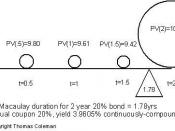Executive SummaryWhen it comes to bonds there is a world of opportunity outside U.S issues. Japanese Government Bonds (JGBs) are considered to be of high quality and a very low credit risk according to MoodyÃÂs, they are guaranteed by the Japanese government. This is of particular interest in the current worldwide economic situation. While JGBs are considered low risk, U.S investorÃÂs must consider other factors such as foreign exchange risk as JGBs are sold in local currency, regulations and tax issues such as withholding tax. The main advantage of investing in foreign government issues is portfolio diversification as they enable the investor to go beyond US specific events.
Foreign Government Issues1. Reason for IssuanceJapanese Government Bonds (JGBs) are issued to raise capital and settle outstanding debt of the Japanese Government. Payment is guaranteed by the Japanese Government. JGB Central Government Bonds outstanding as of September 2009: 694.3
trillion yen.
2. Coupon Rate AnalysisThe Japanese government is responsible for interest and principal payments. Interest is paid semi-annually and principal payments are secured at maturity. The term of the JGB chosen is 10 years. The interest rate of a government bond is decided according to its market value at the time of issue, and will remain unchanged till maturity. Japanese government bonds can be purchased at various financial institutions. JGBs are a financial product traded in the market; you donÃÂt need to wait for maturity. Depending on the market situation, the sales price may differ from the purchase price. (http://www.mof.go.jp/english/jgb-e.htm)OVERVIEW (as of 30/11/2009)Price:100.82Coupon (%):1.4Maturity Date:20th-September-2012Yield to Maturity (%):1.39Current Yield (%):1.36Fitch Ratings:Aa2 (Appendix [D1])Coupon Payment Frequency:Semi-AnnualType:Government Issue{Source-Bloomberg}Bonds that are rated Aa are judged to be of high quality and are subject to very low credit risk. (MoodyÃÂs Ratings). Generally, a lower coupon rate implies a greater modified duration and greater...


